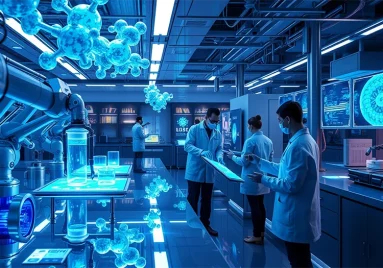The Role of AI in Medical Diagnosis
AI is fundamentally altering how medical professionals diagnose illnesses. Using machine learning algorithms, AI can analyze large datasets, recognize patterns, and provide precise diagnostic recommendations. This reduces the workload on doctors while increasing accuracy.
How AI Enhances Accuracy in Diagnosing Diseases
Traditional diagnosis methods rely on human expertise, which can sometimes lead to misinterpretations. AI, however, processes vast amounts of data quickly, making diagnoses more reliable and reducing human error.
AI in Radiology and Imaging
Medical imaging technologies like X-rays, MRIs, and CT scans are benefiting significantly from AI. AI-powered software can detect abnormalities faster than radiologists, improving early detection of conditions such as tumors and fractures.
AI-Powered Pathology and Laboratory Testing
Pathologists rely on AI-driven tools to examine blood samples, biopsies, and tissue specimens. AI enhances the speed and precision of laboratory testing, leading to quicker and more accurate diagnoses.
AI in Detecting Chronic Diseases
Chronic diseases like diabetes and hypertension require continuous monitoring. AI-driven systems analyze patient data to predict disease progression and recommend personalized treatments.
AI and Early Cancer Detection
AI is proving to be a game-changer in oncology. Machine learning models can detect cancerous cells in mammograms, lung scans, and colonoscopies with remarkable accuracy, often identifying cancer at an earlier stage than human doctors.
AI in Neurology: Diagnosing Brain Disorders
Neurological conditions like Alzheimer’s and Parkinson’s disease can be challenging to diagnose early. AI algorithms analyze brain scans and patient symptoms to detect these disorders before significant damage occurs.
AI in Cardiology: Identifying Heart Conditions
AI assists cardiologists in detecting heart diseases by analyzing ECG data, blood tests, and imaging results. AI-powered diagnostic tools help identify early signs of conditions like arrhythmia and heart failure.
AI in Dermatology: Skin Cancer and Other Conditions
Dermatologists use AI-driven image recognition to diagnose skin diseases, including melanoma. AI tools can analyze skin lesions and moles, improving early detection and treatment outcomes.
AI and COVID-19 Diagnosis
During the pandemic, AI played a crucial role in diagnosing COVID-19 through CT scans and symptom analysis. AI models helped distinguish COVID-19 from other respiratory illnesses with high accuracy.
Machine Learning and Predictive Analytics in Healthcare
AI-driven predictive analytics identify disease outbreaks, monitor patient health trends, and personalize treatment plans. Machine learning algorithms analyze historical data to predict future health risks.
Challenges and Limitations of AI in Medical Diagnosis
Despite its benefits, AI in medical diagnosis faces challenges such as:
- Data privacy concerns
- Bias in AI models
- High implementation costs
- Need for human oversight
Future of AI in Healthcare
The future of AI in medical diagnosis looks promising, with advancements in deep learning, natural language processing, and AI-powered robotics. AI will continue to support doctors in providing better patient care and reducing diagnostic errors.
Conclusion
AI is revolutionizing healthcare by making medical diagnoses faster, more accurate, and accessible. While challenges remain, AI’s potential to improve patient care is undeniable. As technology advances, AI will continue to play a crucial role in transforming the medical field.
FAQs
1. How does AI improve medical diagnosis?
AI analyzes vast amounts of medical data to detect patterns and provide accurate diagnoses, reducing human error.
2. Can AI replace doctors in diagnosing diseases?
No, AI supports doctors by enhancing their decision-making, but human expertise is still essential.
3. Is AI reliable for detecting cancer?
Yes, AI-powered tools can detect cancer at early stages with high accuracy, often surpassing traditional diagnostic methods.
4. What are the risks of using AI in medical diagnosis?
AI can have biases, require vast amounts of data, and still needs human oversight to ensure ethical and accurate use.
5. What is the future of AI in healthcare?
AI will continue to evolve, improving diagnostics, personalized treatments, and overall patient care, making healthcare more efficient and accessible.
Please don’t forget to leave a review.






